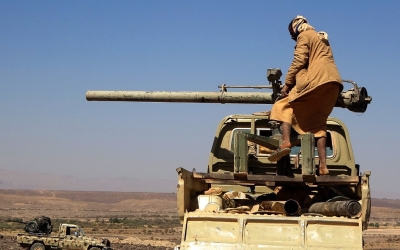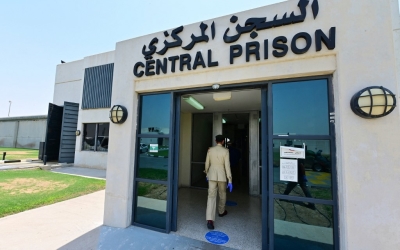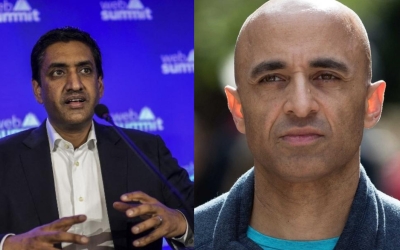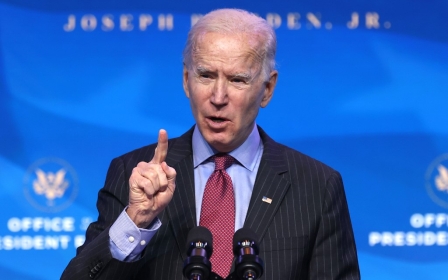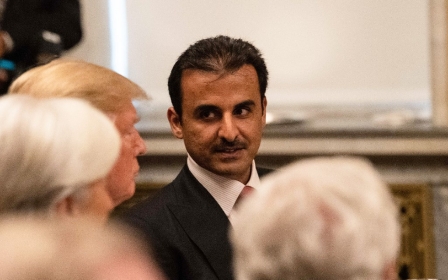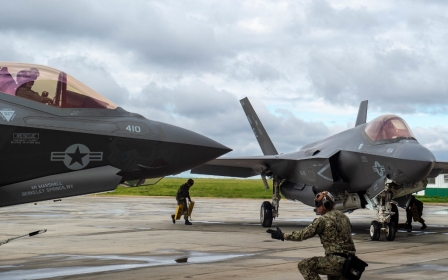UAE deeply involved in Yemen despite claims of withdrawal, experts say
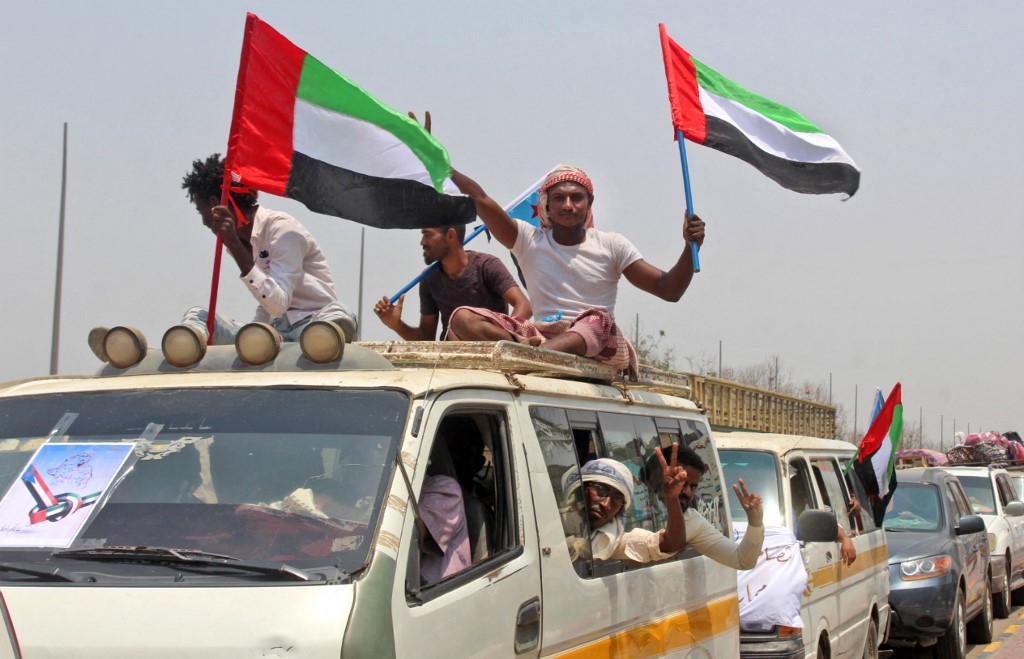
The war in Yemen is emerging as a top foreign policy concern for US President Joe Biden's administration, and while Saudi Arabia has taken the bulk of criticism for its role in the war-torn country, experts say the United Arab Emirates, claiming disengagement, remains deeply involved.
The UAE announced in October that it had ended its military involvement in Yemen, but four months later, those documenting the war have insisted otherwise. From strategic islands to air and sea ports, military bases and militias, the UAE is accused of being heavily active in the civil-turned-proxy war.
Justin Russel, head of the New York Center for Foreign Policy Affairs (NYCFPA) think tank, which is bringing a lawsuit against the US State Department over a now-paused arms deal to the UAE, told Middle East Eye that his organisation has documented continued Emirati involvement in Yemen.
"The UAE, either in the spotlight or under the radar, continues to be an aggressor in the region," Russel said.
"The UAE's withdrawal announcement drew international attention away and basically took the rest of the world off the scent of what they are actually doing in the region… But in our research, there is still funding and other battlefield support from the UAE in Yemen on a regular basis," he continued.
Described by the UN as "the world's worst humanitarian crisis", the conflict has displaced millions and nearly 250,000 people have been killed, mostly at the hands of the Saudi-led coalition, which includes the UAE as its main partner.
While the UAE and Saudi Arabia began their involvement in the country on the side of Yemen's internationally recognised government, in 2017 the Emirates took a slightly separate path, focusing on supporting the Southern Transitional Council (STC).
Still working against the rebel Houthi group - the Yemeni government's and Saudi Arabia's main rival in the country - the STC also aims to restore the independence of South Yemen, which united with the north in 1994.
Bab-el-Mandeb Strait
The UAE's interests in Yemen are varied, but a key goal of the small Gulf nation - which shares no border with Yemen - is maintaining influence over the Bab-el-Mandeb Strait.
The waterway is essential for the passage of about nine percent of the world's seaborne-traded crude oil and refined petroleum.
"It's pretty clear to me as a Yemeni what the UAE's endgame is, and that is to make sure that they have a government in Yemen that is going to make it easy for their oil to travel through Bab-el-Mandeb," Shireen al-Adeimi, a Yemen-born activist and professor at Michigan State University told MEE.
'The world is a small village, thanks to the media, and everyone knows [the UAE is] still in Yemen'
- Mohamed Gezan, undersecretary, Yemen's information ministry
"It's a really important strategic location. It's why Yemen has always had interventions by Saudi Arabia and the US in the past," she said. "That's really what it comes down to."
During its independence, South Yemen controlled the entirety of modern-day Yemen's southern coast and the mouth of the strait, which connects the Gulf of Aden and the Arabian Sea to the Mediterranean via Egypt's Suez Canal.
The strait is 18 miles wide at its narrowest point, which limits tanker traffic to a four-mile-wide channel for inbound and outbound shipments, resulting in an easy-to-control passage.
Throughout the war, the UAE has worked to take up strategic outposts around the waterway.
From Socotra, an island at the mouth of the Gulf of Aden, to Mayyun, an island right in the middle of Bab-el-Mandeb, the UAE has manoeuvred control over some powerful territory with the hopes to maintain influence over ports and seabound traffic in the region.
The government insists those islands and ports remain under Emirate control to this day.
Earlier this month, Mohamed Gezan, undersecretary of the government's information ministry, shot down UAE claims of disengagement.
"The world is a small village, thanks to the media, and everyone knows that you are still in Yemen," Gezan said in a post to Twitter that was aimed at then-UAE Foreign Affairs Minister Anwar Gargash.
"Withdraw your soldiers from Socotra, Balhaf, and Mayyun, and stop arming the militias," he said.
Last month, Mukhtar al-Rahbi, adviser to Yemen's minister of information, also complained that the UAE was refusing to reopen Al Rayan airport in Mukalla, a bustling southeastern seaport and the capital city of Yemen's largest governorate.
The UAE turned the airport into a military base for its forces around the start of the war and has refused to reopen the facility, it says for security reasons.
Rahbi, however, accused Emirati forces of using the airport "as an illegal prison to commit heinous forms of torture against Yemenis".
'That's where the PR comes in'
Still, there are some indications that the UAE is pulling back some of its forces, such as the recent dismantling of the Assab military port and airstrip that it built in Eritrea, 40 miles west of Yemen and right off the coast of the Bab-el-Mandeb Strait.
The military base was a strategic post that the UAE used to import weapons and troops - including foreign mercenaries. Recent satellite imagery has detailed the base's disassembly.
'They make it look like they've withdrawn from Yemen, when all they've done is pull out their official physical presence'
- Shireen al-Adeimi, Michigan State University
But Adeimi warned that the UAE is likely keeping in place foreign forces that it has trained and funded in areas it withdraws from.
"At some point last year they announced that they were withdrawing... But really, what they were saying is that they were leaving behind trained mercenaries while pulling out their official ground troops," Adeimi said.
"That's where the PR comes in - they make it look like they've withdrawn from Yemen, when all they've done is just pull out their official physical presence," she continued.
On Thursday, Human Rights Watch (HRW) released a report that pointed out that the UAE, along with Saudi Arabia, is a highly image-conscious government that "spends billions on PR firms to whitewash their terrible human rights records".
Launched in 2017, the official UAE Soft Power Strategy has sought to improve the country's global reputation abroad despite a series of accusations of war crimes and human rights abuses committed in Yemen, Libya and elsewhere.
"The UAE has been able to take advantage of the Saudis being the front-facing group for this war, while they've been able to kind of take a step back and be behind the scenes," Adeimi said.
Balancing US relations
Adeimi also pointed to the STC's continued imprisonment of Adel al-Hasani, a Yemeni journalist that was arrested by the separatist group more than five months ago.
The Committee to Protect Journalists (CPJ) released a report earlier this month alleging that the STC is unable to free Hasani due to direct political pressure from Abu Dhabi.
This week, US Congressman Ro Khanna, who has long been an advocate for ending US support for the country's role in Yemen, traded barbs with the UAE's ambassador to the US, calling on the Emirates to allow the release of Hasani.
"The STC is backed by the UAE and wouldn't be in existence without the UAE… so we have to be very clear here about its role," Adeimi told MEE in regards to the Emirates' influence over the separatist movement.
In HRW's report on Thursday, the group urged the US to completely end its support for Saudi Arabia and the UAE and to levy sanctions against the two powers to ensure that neither country has "the means to commit further grave violations of the laws of war in Yemen".
Around the end of former US President Donald Trump's term, the administration forced through a gigantic $23bn weapons deal with the UAE, which included the sale of killer drones and F-35 jets.
As one of his first foreign policy moves, President Biden installed a temporary block of some arms sales to Saudi Arabia and the UAE while they are being reviewed, but the wording of the order remains worrying to advocates working against the deals.
Days after the temporary freeze was announced, Secretary of State Antony Blinken seemed to downplay its significance, saying "generally speaking, when it comes to arms sales, it is typical at the start of an administration to review any pending sales to make sure that what is being considered is something that advances our strategic objectives and advances our foreign policy".
"We're very concerned about the wording," NYCFPA director Russel told MEE, adding that their lawsuit against the State Department over the UAE arms deal has not been rescinded despite the freeze and review of the sale.
Russel also pointed out that it is not clear whether the US would oppose arms sales for the UAE to use in Libya, where it is involved in another proxy war.
"Giving the UAE additional high-end, unmanned aerial systems, giving them a fleet of F-35s does nothing to help reduce the impact that [the] UAE has had and continues to have in the region," Russel said, calling for a complete shut down of all US weapons and training contracts with both Saudi Arabia and the UAE.
"All [these weapons deals] do is exacerbate these very large historical human rights crises in the region," he said.
Middle East Eye propose une couverture et une analyse indépendantes et incomparables du Moyen-Orient, de l’Afrique du Nord et d’autres régions du monde. Pour en savoir plus sur la reprise de ce contenu et les frais qui s’appliquent, veuillez remplir ce formulaire [en anglais]. Pour en savoir plus sur MEE, cliquez ici [en anglais].


